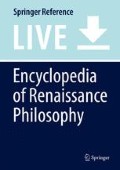Abstract
The term “panpsychism” is derived from Francesco Patrizi’s neologism “pampsychia” created from the Greek words “pan,” that is, “all,” and “psyche,” which is “soul.” Patrizi describes by means of this term the central part of his work Nova de universis philosophia (1591). The panpsychic doctrine on the mind as the fundamental quality of all things in the universe has its origin, however, back in the pre-socratics and was also developed in ancient and Renaissance philosophies. Renaissance panpsychic doctrines are usually formulated as an opposition to Aristotelianism and are connected with the Platonic concept of the world soul animating the world; the stoic notion of pneuma, the spirit penetrating the universe; and the Empedoclean two animate and opposing forces of the world – attraction and repulsion. Although certain signs of panpsychism can be found in Marsilio Ficino’s thought, only Girolamo Cardano and Bernardino Telesio elaborate a genuine panpsychic philosophy. While Cardano follows the theories of the world soul and the hot spirit, Telesio considers all things in the world as sensing, and therefore his doctrine can be called pansensism. Panpsychism was held in three different forms at the end of the sixteenth century. Francesco Patrizi develops the Neoplatonic doctrine of the hierarchical universe where the soul occupies the central position. Giordano Bruno uses panpsychism in his cosmological ideas, and Tommaso Campanella follows both Telesio’s pansensualism and the platonic doctrine of the world soul and incorporates panpsychism into his metaphysics and epistemology.
References
Primary Literature
Agrippa von Nettesheim, Heinrich Cornelius. 1992. De occulta philosophia libri tres. Edited by V. Perrone Compagni. Leiden: Brill.
Bruno, Giordano. 2002. Opere italiane. Edited by Giovanni Aquilecchia. 2 vols, Classici italiani. Torino: UTET.
Campanella, Tommaso. 1925. Del senso delle cose e della magia; testo inedito italiano con le varianti dei codici e delle due edizioni latine. Edited by A. Bruers. Bari: G. Laterza & Figli.
Campanella, Tommaso. 1992. Philosophia sensibus demonstrata. Edited by L. de Franco. Napoli: Vivarium.
Cardano, Girolamo. 1663. Hieronymi Cardani Mediolanensis Opera omnia tam hactenus excusa: hic tamen aucta & emendata. 10 v. Lugduni: Sumptibus Ioannis Antonii Huguetan, & Marci Antonii Rauaud.
Cardano, Girolamo. 2013. The De subtilitate of Girolamo Cardano. In Medieval and renaissance texts and studies. Edited by John M. Forrester. Tempe: Arizona Center for Medieval and Renaissance Studies.
Ficino, Marsilio. 1989. Three books on life. In Medieval & renaissance texts & studies (Series). Edited by Carol V. Kaske and John R. Clark. Binghamton: Medieval & Renaissance Texts & Studies in conjunction with the Renaissance Society of America.
Ficino, Marsilio. 2001. Platonic theology. Books I–IV. Edited by Michael J. B. Allen and James Hankins. 6 vols. Vol. 1, I Tatti Renaissance library. Cambridge, MA: Harvard University Press.
Gilbert, William. 1958. On the magnet, the Collector’s series in science. Edited by S. P. Thompson. New York: Basic Books.
Patrizi, Francesco. 1591. Francisci Patricii Nova De Universis Philosophia. In Qua Aristotelica Methodo. non per motum, sed per lucem, & lumina, ad primam causam ascenditur. Ferrara: Apud Benedictum Mammarellum
Telesio, Bernardino. 2013. De rerum natura iuxta propria principia, libri IX: Orazio Salviani, Napoli 1586. Edited by Guido Giglioni. Roma: Carocci.
Secondary Literature
Allen, Michael J.B. 1987. Marsilio Ficino’s interpretation of Plato’s Timaeus and its myth of the demiurge. In Supplementum festivum: Studies in honor of Paul Oskar Kristeller, ed. James Hankins, John Monfasani, and Frederick Purnell, 399–439. Binghamton: Medieval & Renaissance Texts & Studies.
Blum, Paul Richard. 2014. Francesco Patrizi’s principles of psychology. In Francesco Patrizi. Philosopher of the renaissance, ed. Tomáš Nejeschleba and Paul Richard Blum, 185–212. Olomouc: Univerzita Palackého Olomouc.
Brickman, Benjamin. 1941. An Introduction to Francesco Patrizi’s nova de universis philosophia. New York: Diss. Columbia University.
Cassirer, Ernst. 2000. The individual and the Cosmos in renaissance philosophy. Mineola: Dover Publications.
Ernst, Germana. 2010. Tommaso Campanella the book and the body of nature. Dordrecht/New York: Springer.
Fierz, Markus. 1983. Girolamo Cardano. In Physician, natural philosopher, mathematician, astrologer, and interpreter of dreams, 1501–1576. Boston: Birkhäuser.
Headley, John M. 1997. Tommaso Campanella and the transformation of the world. Princeton: Princeton University Press.
Kristeller, Paul Oskar. 1964. Eight philosophers of the Italian renaissance. Stanford: Stanford University Press.
Pagel, Walter. 1982. Paracelsus; an introduction to philosophical medicine in the era of the renaissance. 2nd rev. ed. Basel/New York: Karger.
Skrbina, David. 2005. Panpsychism in the west. Cambridge, MA: MIT Press.
Skrbina, David. 2009. Panpsychism in history. An overview. In Mind that abides: Panpsychism in the new millennium, ed. David Skrbina, 1–29. Amsterdam/Philadelphia: John Benjamins Publication.
Walker, Daniel Pickering. 2000. Spiritual and demonic magic: From Ficino to Campanella. University Park: The Pennsylvania State University Press.
Author information
Authors and Affiliations
Corresponding author
Editor information
Editors and Affiliations
Section Editor information
Rights and permissions
Copyright information
© 2019 Springer Nature Switzerland AG
About this entry
Cite this entry
Nejeschleba, T. (2019). Panpsychism. In: Sgarbi, M. (eds) Encyclopedia of Renaissance Philosophy. Springer, Cham. https://doi.org/10.1007/978-3-319-02848-4_436-1
Download citation
DOI: https://doi.org/10.1007/978-3-319-02848-4_436-1
Received:
Accepted:
Published:
Publisher Name: Springer, Cham
Print ISBN: 978-3-319-02848-4
Online ISBN: 978-3-319-02848-4
eBook Packages: Springer Reference Religion and PhilosophyReference Module Humanities and Social SciencesReference Module Humanities

